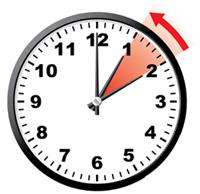Yesterday the government Cabinet approved the proposal of Interior Minister Gideon Saar to extend Daylight Savings Time until the end of October. The bill has to go to the Knesset for final approval, though it is expected to pass easily.
The discussion around the proposal has focused on mainly being harmful to religious workers. In October sunrise will be so late that it will make it difficult for people who need to get to work early to have davened prior to going to work. Some people might even be forced to choosing between davening and being late for work and between going to work and skipping davening.
There is a psak that would solve the dilemma, but it seems to be unpopular in many places. That is, technically, one could daven before sunrise. Of course, there is an earliest time one could daven, but I don't think that earliest time would ever present the same problem.
People don't like this solution, calling it a b'dieved. I have heard a rav say that davening before sunrise is just as b'dieved as davening after sunrise. So anyone willing to daven at 7:00 or 8:00, for example, should theoretically have no halachic objection to davening before sunrise either. But I know that this is not the accepted custom and while some do that, many prefer not to.
 Interestingly, I did learn something new because of this. While of course it was always halachically preferable to daven at sunrise, I have always thought that the preference for davening at sunrise is in relation to davening later. Most won't daven earlier, even though it is an option. According to what I read in Srugim, it used to be exactly the opposite - the sunrise prayers were really the late minyan, not the early minyan. According to that, people commonly davened earlier, and the halachic preference for sunrise was in reference to davening earlier, not later. I guess that would be because in the days of working in agriculture, they had to be working in the fields very early, so they davened even before sunrise. Later, when other fields of employment became more popular, with agriculture going on the decline, things got turned around, people did not need to be up and out so early any longer, and sunrise became the early minyan for most people and regular davening became the later minyanim.
Interestingly, I did learn something new because of this. While of course it was always halachically preferable to daven at sunrise, I have always thought that the preference for davening at sunrise is in relation to davening later. Most won't daven earlier, even though it is an option. According to what I read in Srugim, it used to be exactly the opposite - the sunrise prayers were really the late minyan, not the early minyan. According to that, people commonly davened earlier, and the halachic preference for sunrise was in reference to davening earlier, not later. I guess that would be because in the days of working in agriculture, they had to be working in the fields very early, so they davened even before sunrise. Later, when other fields of employment became more popular, with agriculture going on the decline, things got turned around, people did not need to be up and out so early any longer, and sunrise became the early minyan for most people and regular davening became the later minyanim.
I thought that was an interesting revelation. Does anybody know if this is historically accurate?
Another development is a request for a new law proposal due to the effects of the DST extension. The head of Machon Keter - an organization dealing with economic issues according to the Torah, the DST extension, as already explained, will present a problem for people who need to leave early to go to work. Even allowing them to daven early - prior to sunrise, in the second half of October, anybody who needs to leave their house before 6 AM will still have a problem.
Rav Ishon, the head of Machon Keter, says that the law allows an employee to daven at his workplace during the workday, with prayer times being arranged in accordance with the needs of the workplace and the requirements of the religion of the employee. However, unlike certain breaks that are guaranteed by law so the employee can get some air for a few minutes, while the employer has to give the employee time to pray, he does not have to pay the employee for his praying time.
Rav Ishon requested a new law proposal to adjust that, so that any employee who has to leave his house within a range of 40 minutes prior to the earliest time one is allowed to daven would be allowed to daven during work hours and would also be paid for that time.
(source: Kikar)
I see the need to protect the worker, so that he/she should not have to be put in a situation of needing to decide between working and davening - plenty of employees would decide they cannot afford to lose 20 minutes or 40 minutes of pay and might decide to continue working instead of davening. However, I do not see why the employer has to pay for it - what did he do wrong that suddenly he has to foot the bill, when he never had to before?
I would suggest that maybe Bituach Leumi should have to pay for that davening time, instead of the employer. Also, if employers know they will have to pay for non-work time, they might be reluctant to hire religious employees. Having the payment for this time taken away from them and put in the hands of the government, who is really at fault for the issue anyway, would resolve that,a s now the employer is taking no loss.
